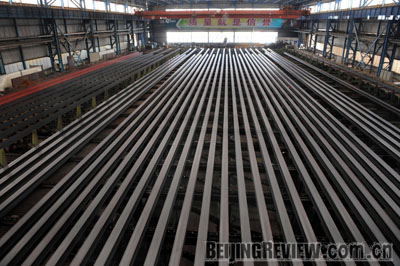|

FIGHTING MONOPOLIES: Experts believe that foreign mergers and acquisitions by companies
outside China, such as Australia's iron ore giant BHP Billiton's acquisition of Rio Tinto,
should be subject to China's anti-monopoly regulations, as the deal will
have a great impact on China's iron and steel production
On August 4, the State Council officially announced the first series of regulations for determining potentially monopolistic behaviors among companies and other business entities. It is expected to issue further detailed guidelines for enforcing the country's new Anti-Monopoly Law, which went into effect on August 1.
According to the regulations, all "combinations" must apply for and receive approval from the government authorities in charge of anti-monopoly checks. Combinations include mergers and acquisitions, share or asset sales that give one company control of another, and deals on human resources and technology control in which one company can gain control of or be able to impose decisive influence over another firm through signing a contract or by other means. Among these activities, mergers and acquisitions are the most important and most common forms of combinations.
The regulations set specific standards about which business entities must apply for and receive approval from the Ministry of Commerce. They include companies whose joint global revenues exceeded 10 billion yuan ($1.46 billion) in the last fiscal year; proposed deals in which at least two or more companies each reported more than 400 million yuan ($58 million) of revenue in China in the previous fiscal year; companies whose combined revenues in China exceed 2 billion yuan ($293 million); and activities involving at least two entities each of which has reported more than 400 million yuan ($58 million) of revenue in China in the last fiscal year. Companies that fall into these categories but fail to apply for and receive approval from regulators will not be allowed to carry out their proposed combination activities.
Before the Anti-Monopoly Law came into effect, foreign companies only had to apply for approval from Chinese regulators if they were going to acquire or merge with a domestic company. The previous regulation on the takeover of domestic enterprises by foreign investors, which was revised in 2006, was based on the concept of market occupation. It required foreign entities or their relevant companies to report to regulatory departments if they obtained more than 20 percent of any given market in China and would eventually increase their market share to 25 percent. The new regulations have replaced market occupation with revenue, because it is easier for regulators to determine a company's revenue than its market share.
In an interview with Beijing Review, Huang Yong, an anti-monopoly law professor at the University of International Business and Economics, said the new regulations have expanded the spectrum for investigations of potential monopolies, because they would prevent a major crash on the domestic market caused by an economic giant.
Mei Xinyu, a researcher at the Chinese Academy of International Trade and Economic Cooperation under the Ministry of Commerce, said that the detailed regulations were very necessary in the new century, according to an article on the People's Daily website. He cited the example of Australian company BHP Billiton Ltd.'s acquisition of Rio Tinto Group. Both are foreign companies registered outside of China, but they exert enormous influence on the domestic iron ore market. Therefore, the acquisition should be subject to China's Anti-Monopoly Law, he said.
"The whole world produces approximately 1 billion tons of iron and steel each year, and China produces nearly half of the amount," Mei was quoted as saying. "BHP Billiton's merger and acquisition in Australia must be restricted by the U.S. and the EU's anti-monopoly laws. The company's aggregated iron ore exports to the two economic entities are even less than its exports to China alone."
Given the restrictions under U.S. and EU anti-monopoly laws, the deal also should be checked by Chinese anti-monopoly investigators, because it would have a great impact on China, Mei said.
It will be difficult for regulators to enforce the law's application standards, Huang said. If the application standards are too low, the companies would have to apply and seek approval even for the smallest merger activity. This would increase their operational costs and not be conducive to their economies of scale. But if the standards are too high, a lot of monopolistic behaviors would be easily neglected, Huang said.
The new regulations stipulate that the majority of domestic companies will not have to apply for permission for their merger and acquisition efforts. A National Bureau of Statistics report issued in 2006 showed only 3 percent of the country's 440,893 companies in the fields of manufacturing, mining, power, coal and gas, transportation, storage and postal services, construction and retailing, had annual revenues of 400 million yuan ($58 million) and would potentially qualify for anti-monopoly reviews.
Nevertheless, the application standards described in the regulations are suitable for the country's current economic conditions, Huang said. He also noted that it is an internationally recognized practice that the majority of the business entities do not have to apply for proposed mergers and acquisitions. | 